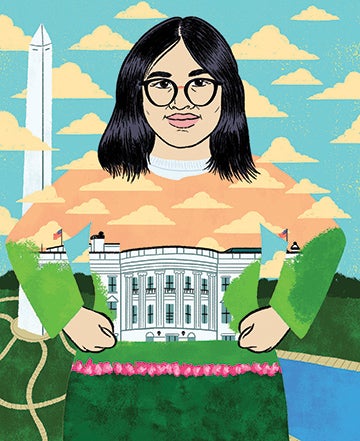Greetings From Washington, DC
Thu Nguyen describes living and working within minutes of the White House.

Fall 2023
By Thu Nguyen '17
My commute to work is a 30-minute walk downhill that gives me a beautiful view of the Washington Monument against the city’s skyline of row houses and historic buildings. The office is a 15-minute walk to the White House, which is situated in the middle of downtown. I’m not really sure which is more surreal — passing the White House at least once a week on my way to a meeting or seeing the U.S. Capitol every time I take the bus to see friends on the east side.
In my job as an executive director at OCA-Asian Pacific American Advocates — a 50-year-old Asian American, Native Hawaiian and Pacific Islander civil rights organization — I have the privilege of representing and serving the needs of AANHPIs from across the country. From bringing programs to youth to advocating on issues that impact our families, I’m able to take part in work that creates both short- and long-term impact in communities both within and outside that of AANHPIs.
The most surreal experience is getting to go inside the White House. The experience starts with an email from the White House Social Events Office inviting me to celebrate AANHPI Heritage Month or to witness the president signing new bills that I advocated on. These invitations come anywhere from a month to three days before the event. Regardless of the notice, I clear my schedule.
Before the president even makes an appearance, I’ve had to hold back the emotion welling up at the thought of being here without my parents, who risked everything to build a new life in America.
It’s a science to me now, entering the White House: Arrive an hour early with only a shoulder bag that fits a phone, battery pack and cardholder. Walking up the steps to the building feels like one of the longest walks every time. For public events, musicians are always present to accompany guests through the halls (from The President’s Own or other military orchestras). Once, I got to see the “first dog” enjoying a walk in the garden.
Before the president even makes an appearance, I’ve had to hold back the emotion welling up at the thought of being here without my parents, who risked everything to build a new life in America.
Moving here after graduating really opened my eyes to what was “beyond the hedges.” Our country’s history is embedded in this city, from the buildings and monuments to the segregated, yet gentrifying, neighborhoods and underrated food and coffee scene. Everyone here grapples with the American dream in very different ways — from within the government, as a voice for communities outside of D.C., or as a struggling resident of a city that is not represented in the federal government itself. As a child of boat refugees, it was initially difficult to come to terms with the opportunity of working in one of the most powerful cities in the world while my own family continues to struggle to achieve their own dreams.
This role gives me such grand opportunities to enter the White House, but my family and community serve as grounding reminders as to why it is important that I am able to be here in Washington, D.C.
